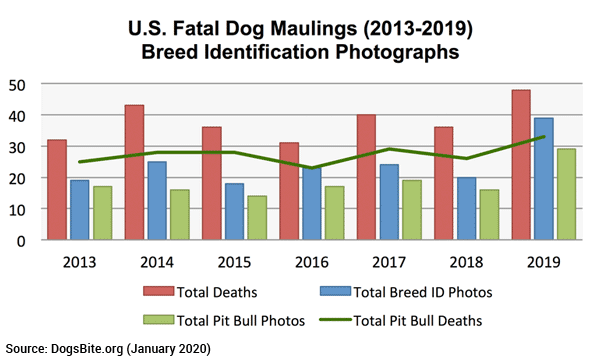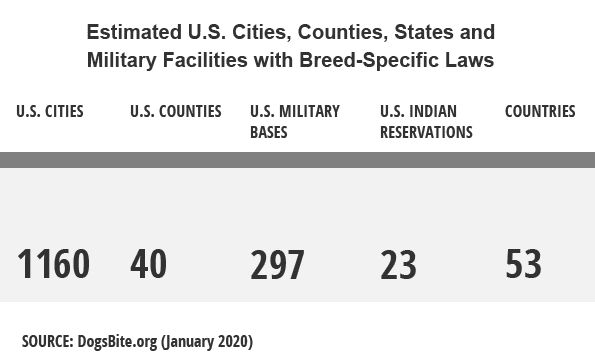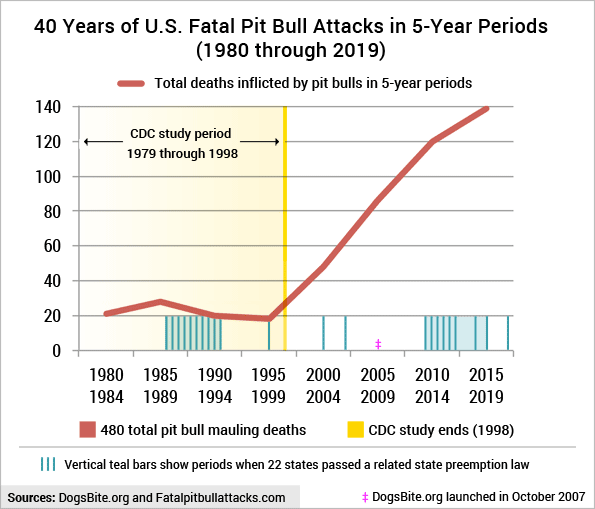81% of All Dog Bite Fatalities Had Breed Identification Images

Photographs of six fatally attacking dogs in 2019 obtained from multiple sources.
Jump down to view all 2019 breed identification photographs or read our analysis first.
DogsBite.org - In 2013, we began the tradition of publishing breed identification photographs of fatally attacking dogs when available through news reports, animal control agencies, police departments and social media websites. Of the 48 dog bite fatalities recorded in 2019, a record 81% (39) had some form of an identification photograph, the highest percentage since we began our collection effort. Pit bulls and their mixes represent 74% of all images collected in 2019.
Of the 39 cases with breed identification photographs, 59% (23) contained images captured or republished by news media; 59% (23) contained images located on social media pages of the dog's owner or family members; and 49% (19) contained images that were the result of DogsBite research and otherwise may have gone unpublished. Police and animal control agencies only released images in 6 cases, yet 81% (39 of 48) of all deaths involved dogs taken into quarantine.
(Percentages are higher than 100% due to a single death containing multiple dog images, each attributed to a different source, as well as images that fall into overlapping publishing categories.)
Identification Photographs (2013-2019)
Of the 266 dog bite fatalities recorded by our nonprofit since January 1, 2013, nearly two-thirds, 63% (168), have a breed identification photograph published on our website. Of the 192 deaths inflicted by pit bulls and their mixes since January 1, 2013, 67% (128) have a breed identification photograph published on our website. Of the total 168 fatality cases with a breed identification image collected since 2013, pit bull-inflicted deaths with a supporting photo comprise 76% (128).
In 2019, 88% (29 of 33) of pit bull-inflicted fatalities had some form of a breed identification photograph, the highest percentage in our records.

Breed Misidentification Conflicts
The most controversial cases in 2019 did not involve pit bulls. Last year proved to be a year when certain dog breeds, which infrequently inflict fatal attacks, did so, including two show-circuit Doberman pinschers, two coonhounds and a pair of rescue great danes. All of these dogs fatally attacked their owner. Of these three deaths, only the coonhounds lacked a recent identification image, though the victim's husband is seen with one redbone coonhound on Facebook in 2012.
2019 also marks the first year when our nonprofit had to reach above and beyond to show some readers that pit bulls were not involved in several fatal attacks. This fury was primarily seen on our social media pages after the coonhound and great dane fatalities, but was also present after a husky killed a newborn. Both great danes and huskies killed 7 or more people during the 20-year CDC study period (1979 to 1998). Huskies continue to rank among the top 7 killers since 2005.
Summary
81% of dog bite fatality cases in 2019 had some form of a breed identification photograph, the highest in our records. Our nonprofit collected nearly half of these images through our research and FOIA efforts. This additional level of photographic evidence is on top of the 1,000 plus multi-sourced news articles we collected and 18 public information requests we sent to various coroner's offices, police and animal control departments for 48 dog bite fatality victims in 2019.
What continues to be troubling is the number of cases involving dogs taken into quarantine after a fatal attack (81% in 2019), but few police/shelter agencies release an identification image. We then can only rely on the news media being at the scene, social media images or obtaining an image through a FOIA request. Releasing a breed ID photograph after a deadly dog attack should be standard protocol, like Riverside County Animal Services does after all significant attacks.
2019 Fatal Dog Attack Breed Identification Photographs
Lana Bergman - Joshua Tree, California
Photos of two of four fatally attacking pit bulls (social media & news media)

See: Summary |
Full blog post |

Lana Bergman, 70-years old, was killed by four pit bulls belonging to guests on her property near Joshua Tree, California on January 16, 2019. Her brother characterized the guests as "squatters" who had overstayed their visit. The pit bulls killed Bergman one day before the guests were
ordered to leave her premises.
Ed Stanley - Amarillo, Texas
Photos of two fatally attacking dogs (animal services & news media)

See: Summary |
Full blog post |

Ed Stanely, 85-years old, died two weeks after he was attacked and severely injured by loose dogs on his own driveway in Amarillo, Texas on January 7, 2019. The department of Amarillo Animal Management and Welfare said this was not just a dog attack -- this man was mauled by a pit bull-mix and shepherd-mix.
Patricia Henson - Tucson, Arizona
Photo of fatally attacking german shepherd-mix (animal services & news media)

See: Summary |
Full blog post | Patricia Henson, 8-months old, was killed by a dog while her mother slept in Tucson, Arizona. The autopsy report stated she sustained "abrasions, lacerations, contusions, and puncture wounds; absence of soft tissues; hemorrhages; hematomas and lacerations." Her mother was charged with felony child abuse.
Ashton McGhee - Guthrie, Kentucky
Photos of family pit bull on mother's facebook page (DogsBite & social media)

See: Summary |
Full blog post |

Ashton McGhee, 1-year old, was killed by a family pit bull-mix while visiting his grandparent's home in Guthrie, Kentucky on February 7, 2019. The baby had been playing with a ball on the floor when the dog came inside from outdoors. The dog viciously attacked the baby's head, including breaking the baby's jaw.
Elaine Richman - Houston, Texas
Photos of two fatally attacking Doberman pinschers (animal services & news media)

See: Summary |
Full blog post | Elaine Richman, 66-years old, was found dead in her backyard with multiple dog bites. Her two show dogs, Doberman pinschers, were found inside her home. The autopsy conducted by the Harris County Institute of Forensic Sciences determined Richman died from "sharp force injuries" to her face, neck and scalp.
Angela Johnson - Anza, California
Photos of two of three fatally attacking pit bulls (animal services & news media)

See: Summary |
Full blog post |

Angela Johnson, 54-years old, died nearly two months after a violent pit bull attack. She remained on life support until she died on February 9. The dogs ripped out a "main artery in her throat, causing a severe stroke to the left side of her brain, leaving her half brain dead," her son stated on her GoFundme page.
Nancy Burgess-Dismuke - Greenville, South Carolina
Photos of two fatally attacking family boxer-mixes (news media)

See: Summary |
Full blog post | Nancy Burgess-Dismuke, 52-years old, died after a wrestling game with her two boxer-mixes turned into a violent attack. Neighbors heard her cries and found one dog latched onto each of her arms tearing into her flesh "eating her." One of the dogs had attacked her in the past, but Burgess-Dismuke refused to put it down.
Johnnie Garner - Lubbock, Texas
Photos of fatally attacking pit bull-mixes (police & news media)

See: Summary |
Full blog post |

Johnnie Garner, 88-years old, was brutally killed by a pack of pit bulls on February 27. Two days earlier, the dogs' owner had tried to surrender his dogs to Lubbock Animal Services after a separate attack. The agency told him he needed to "make an appointment" to drop off the dogs and the earliest date was March 1.
Jacari Long - Salisbury, North Carolina
Photos of fatally attacking pit bull-boxer mix (news media)

See: Summary |
Full blog post |

Jacari Long, 6-months old, was killed by his babysitter's male pit bull-boxer mix in Salisbury, North Carolina. The babysitter left him inside her home in a car seat while she cleaned out the back of her car to make room for the baby. When she returned, the dog was attacking the baby. No criminal charges were filed.
Tanner Kinnamon - High Springs, Florida
Photos of fatally attacking pit bull and American bulldog-mix (DogsBite & social media)

See: Summary |
Full blog post |

Tanner Kinnamon, 2-years old, was killed by two of his aunt's six pit bull-type rescue dogs while under the care of his grandmother. Two of the dogs were let out of their crates into the yard. The child went outside to play and the grandmother went inside the home. When she returned, the dogs were attacking the child.
Jimmy Grigg - Galveston County, Texas
Photos of two of three fatally attacking dogs (DogsBite FOIA)

See: Summary |
Full blog post | Jimmy Grigg, 53-years old, was mauled and killed by three dogs belonging to his brother on March 13, 2019 in Galveston County, Texas. His brother told police after the attack that his dogs were usually "put up and secured," but was unsure how they got out and attacked his brother. No criminal charges were brought.
Jaysiah Chavez - Fresno, California
Photos of two fatally attacking rottweilers (news media)

See: Summary |
Full blog post |

Jaysiah Chavez, 2-years old, was killed by a pair of roaming rottweilers in his own front yard. Investigators said the rottweilers dug a hole under their owner's fence, ran through a neighbor's yard, crossed a street then attacked the boy who had wandered out his front door into his yard. No criminal charges were brought.
Johana Villafane - Irving, Texas
Photos of two fatally attacking family pit bulls (DogsBite & social media)

See: Summary |
Full blog post |

Johana Villafane, 33-years old, was killed by her own two pit bulls. The attack happened while Villafane was visiting her dogs in quarantine due to biting a man eight days earlier. She took her dogs into the backyard exercise area, where they attacked her. She was not discovered by staff for 35 minutes.
Isaiah Geiling - Louisville, Kentucky
Photos of fatally attacking family pit bull "King" (news media & social media)

See: Summary |
Full blog post |

Isaiah Geiling, 2-years old, was killed by a male pit bull. The boy's grandmother said the dog had bitten Isaiah three weeks earlier. The dog's owners, Jack Charpring Jr. and Sharon Charpring were charged with second-degree manslaughter. The boy's mother, Jennifer Geiling, was charged with reckless homicide.
Robert Quick - Fort Madison, Iowa
Photo of fatally attacking male boxer-mix "Hercules" (DogsBite, owner supplied)

See: Summary |
Full blog post | Robert Quick, 33-years old, died after being attacked by a brown male boxer-mix. During the rampage attack, the dog attacked two adult males and a 5-year old female. Fort Madison police open fired on the dog at the scene, killing it. All three victims were transported to a local hospital, where Quick was pronounced dead.
Crystal Pearigen - Bakersfield, California
Photos of two of three fatally attacking dogs (DogsBite, social media & news media)

See: Summary |
Full blog post |

Crystal Pearigen, 36-years old, died in a Costco parking lot after being attacked by three dogs. Two of the dogs, a pit bull and mixed-breed, belonged to a nearby business owner. The third dog, also a pit bull, was a stray. Pearigen was homeless at the time. When she was a teenager, her mother was murdered.
Nicholas Farris - Newman, California
Photos of fatally attacking pit bull-mastiff mix (DogsBite & social media)

See: Summary |
Full blog post |

Nicholas Farris, 2-years old, was killed by a family dog in Newman, California on June 27, 2019. Arriving officers found the boy in the backyard. He was taken to Emmanuel Medical Center, where he was pronounced dead. A Stanislaus County Sheriff's news release stated the dog involved was a pit bull-mastiff cross.
Maria Crawford - Ventura, California
Photos of fatally attacking pit bull-mix (DogsBite FOIA & social media)

See: Summary |
Full blog post |

Maria Crawford, 54-years old, died of "dog bite wounds of the head, neck and leg" on June 28, 2019, according to the Ventura County Medical Examiner's report. The family dog, described as an "elderly pit bull-mix" by family members, had attacked Crawford two times before her death, including severing her ear.
Brian Butler - Gilbertsville, Kentucky
Photos of two of three fatally attacking pit bulls (DogsBite & social media)

See: Summary |
Full blog post |

Brian Butler, 46-years old, was killed by up to three pit bulls in Gilbertsville, Kentucky on June 29, 2019. Kentucky State Police arrested Daniel Kai Alexander, 29, on a felony arrest warrant in connection to his mauling death. The investigation showed that Alexander tampered with evidence at the crime scene and more.
Ruth Flores - Gainesville, Georgia
Photos of twin littermate huskies, only one fatally attacked (DogsBite & social media)

See: Summary |
Full blog post | Ruth Flores, 3-weeks old, died after being bitten on the head an "undetermined number of times" by a family dog. The infant's mother was in the home when the family's 2-year old husky attacked the sleeping baby in a bedroom. At least two other huskies and another dog also lived at the home in Gainesville, Georgia.
Homer Utterback - Uniontown, Pennsylvania
Photos of fatally attacking family pit bull "Petey" (social media & news media)

See: Summary |
Full blog post |

Homer Utterback, 52-years old, was mauled to death by his own pit bull in Uniontown, Pennsylvania. Utterback's girlfriend told police the male pit bull, Petey, had been their pet for a decade and was Utterback's "best friend." The Utterback household also had at least four more pit bulls; all offspring of Petey.
Mario Moore - Memphis, Tennessee
Photos of two fatally attacking dogs in pack attack (animal control & news media)

See: Summary |
Full blog post |

Mario Moore, 40-years old, died after being attacked by a pack of dogs in Memphis, Tennessee on July 18, 2019. Sherry Pruitt said she was attacked by the same dogs on May 7. Officials released photographs of two dogs, a mixed-breed and a pit bull-mix, that were involved in both Moore's and Pruitt's attack.
Nelson Cabrera - Irving, Texas
Photo of fatally attacking pit bull "Bella" (DogsBite & social media)

See: Summary |
Full blog post |

Nelson Cabrera, 16-years old, was killed by three pit bulls secured in their owner's backyard. The dogs' owner, Guillermo Lorenzo, told media outlets, "He has no right to be in [my] yard." Cabrera had stayed at Lorenzo's home for a few days before the attack, but Lorenzo later canceled the boy's access to his property.
Emma Hernandez - Detroit, Michigan
Photos of two of three fatally attacking pit bulls and pit bull-mixes (news media)

See: Summary |
Full blog post |

Emma Hernandez, 9-years old, was killed by three dogs, pit bulls and pit bull-mixes, while riding her bike in an alley behind her home in southwest Detroit on August 19, 2019. One bystander began firing on the dogs. Deputy Fire Commissioner Dave Fornell said, "We were performing EMS under gunfire" at the scene.
Adrieanna O'Shea - Knox County, Tennessee
Photos of three of five fatally attacking dogs (social media & news media)

See: Summary |
Full blog post |

Adrieanna O'Shea, 19-years old, was brutally killed by a pack of dogs after visiting a home to pick up her purse -- she had left it there the night before. The landlord and owner of the dogs told deputies "the dogs were doing their jobs." The dogs included, three mastiff/mastiff-mixes, one rottweiler-mix and a pit bull.
Arlene Renna - Pleasant Valley, New York
Photo of one of two fatally attacking coonhounds (DogsBite & social media)

See: Summary |
Full blog post | Arlene Renna, 67-years old, was discovered unconscious on the living room floor by her husband after he arrived home. The investigation by New York State Police determined the wounds and circumstances were "consistent with a dog attack." Both pet coonhounds were seized. It is unknown if the dogs were euthanized.
Baby "Doug" Doe - Granite Bay, California
Photos of fatally attacking female family pit bull (DogsBite & social media)

See: Summary |
Full blog post |

Baby "Doug" Doe, 13-months old, was mauled to death by a female pit bull while under the care of a babysitter. The babysitter, a female relative, was in "very close proximity" with the child when the dog attacked. In July of 2015, the baby's parents created an Instagram page for their female family pit bull "Bella."
Alan Bruce - Bennington, Oklahoma
Photo of one of three fatally attacking pit bulls (news media)

See: Summary |
Full blog post |

Alan Bruce, 56-years old, was brutally attacked by three dogs, two pit bulls and a pit bull-mix, while trying to visit the owner's home. The dogs' owner was away at the time. "He had severe trauma, bite marks to his trunk and head and arms with just massive trauma," Bennington Police Chief James Heil said.
Morgan Crayton - Hampton, Virginia
Photos of fatally attacking pit bull "Chopper" (DogsBite & social media)

See: Summary |
Full blog post |

Morgan Crayton, 31-years old, was attacked in the throat by her pit bull and died of her injuries the next day. Her 92-pound male pit bull, named "Chopper," was taken into custody by authorities. Police estimated the dog was at least 2-years old. Crayton and her partner had owned the dog for about nine months.
Steven Thornton III - Louisville, Kentucky
Photos of one of two fatally attacking rottweiler-mixes (news media)

See: Summary |
Full blog post |

Steven Thornton III, 3-years old, was killed by two rottweiler-mixes that were kept in his family's backyard. Police said the boy climbed through an open bedroom window while the rest of his family slept. Family members found him the next morning. A neighbor indicated the two rottweilers were new to the child's home.
Dustin Bryan - Modesto, California
Photos of two fatally attacking family pit bulls (animal control & news media)

See: Summary |
Full blog post |

Dustin Bryan, 21-years old, was found covered in blood and dead on a couch in a family member's home on October 9, 2019. Police believe two pit bulls living at the home, "Beze" and "Saxon" mauled and killed Bryan. Jacob Anderson, who lived at the home said the pit bulls "had never been aggressive in the past."
Brandy Boschen-O'Dell - Bay City, Michigan
Photos of fatally attacking pit bull "Chester" (DogsBite & social media)

See: Summary |
Full blog post |

Brandy Boschen-O'Dell, 41-years old, died after she was attacked by a pit bull belonging to her live-in boyfriend in Bay City, Michigan. Her boyfriend told investigators that Boschen-O'Dell told him that his male pit bull "Chester" had previously bitten her, but she told other people the bite injury was from a "box cutter."
Mary Matthews - Clearcreek Township, Ohio
Photos of two fatally attacking rescue great danes (social media & news media)

See: Summary |
Full blog post | Mary Matthews, 49-years old, was killed by her two rescue great danes in Clearcreek Township, Ohio. Her husband, Dale, and his son found her bloated and bloody body. Earlier that day, Dale had been released from the Warren County Jail. Coroner Doyle Burke said an autopsy showed the "cause of death is dog attack."
Janet D'Aleo - Suffield, Connecticut
Photos of fatally attacking rescue pit bull "Dexter" (DogsBite, social media & news media)

See: Summary |
Full blog post |

Janet D'Aleo, 95-years old, died after being attacked by a pit bull owned by Annie Hornish, a senior state director of the Humane Society of the United States. D'Aloe sustained "massive injuries including flesh, muscle and tendon loss to the lower extremities." Hornish had acquired "Dexter" four months earlier.
Lasaro Macedo - Madera, California
Photos of fatally attacking pit bull at different ages (DogsBite & social media)

See: Summary |
Full blog post |

Lasaro Macedo, 38-years old, was found dead in a dry riverbed with dog bite injuries on November 11, 2019. Officers shot and killed a "vicious" pit bull with blood on its face at the scene. The dogs' owner, Heather Anglin, was a longtime backyard pit bull breeder. Anglin and her boyfriend were charged with manslaughter.
Lorena Cordova - Dacula, Georgia
Photos of two of three fatally attacking pit bulls (DogsBite & social media)

See: Summary |
Full blog post |

Lorena Cordova, 47-years old, died after suffering a vicious attack by three pit bulls in Dacula, Georgia. The attack occurred in the 3000 block of Luther Wages Road on September 16. Cordova remained at a trauma center until her death on November 21. The dogs' owners were charged with reckless conduct.
Cledith Davenport - Broken Bow, Oklahoma
Photos of two fatally attacking dogs in pack attack (DogsBite, social media & news media)

See: Summary |
Full blog post |

Cledith Davenport, 79-years old, was killed by a pack of loose dogs belonging to his neighbor on December 14, 2019. McCurtain County deputies were called to the scene after a mail carrier saw Davenport lying halfway in a ditch on his property. The attacking dogs were part pit bull, part cattle dog and mixed-breeds.
Melissa Astacio - Somerset, Massachusetts
Photos of fatally attacking family pit bull "Amigo" (social media & news media)

See: Summary |
Full blog post |

Melissa Astacio, 44-years old, was mauled to death by her pet pit bull of eight years at her home on December 20, 2019. Police officers were forced to deploy a Taser on the dog so that paramedics could assist the victim. The neutered male pit bull "Amigo" killed Astacio while she was allegedly having a seizure.
Medessa Ragsdale - Houston, Texas
Photos of two of three fatally attacking pit bulls (news media)

See: Summary |
Full blog post |

Medessa Ragsdale, 44-years old, was found dead lying in a ditch after being mauled by three pit bulls. The dogs also attacked and seriously injured a 49-year old female. She was transported to local hospital in stable condition. The attack occurred just before 6:00 am at 5521 Arlington Street on December 21.
Post Publication Identification Photographs
Breed identification photographs discovered after the publication of this post on January 7, 2020. These photographs are not included in our overall analysis; they were unavailable at that time.
Wayne Pattison - Lumberton, Texas
Photos of fatally attacking rescue pit bull-mix (DogsBite & social media)

See: Summary |

Wayne Pattison, 79-years old, died five days after being attacked by his dog. The attack occurred on January 15. He was transported to a hospital and released on January 18. He died two days later. Pattison had taken over the care of "Bradford," a pit bull-mix, from his granddaughter, who had rescued the dog from death row.
Benjamin Cobb - Hazel Park, Michigan
Photos of fatally attacking male pit bull (DogsBite & provided)

See: Summary |
Full blog post |

Benjamin Cobb, 4-years old, was brutally killed by a pit bull being housed at his home in Hazel Park, Michigan. The child's mother was in the room when the 60-pound dog attacked. She tried to fight the dog off by stabbing it with scissors then a steak knife. The dog was still "actively attacking" the boy when police arrived.
How We Track Photograph Sources
We track the identification photograph's original source. There may be multiple images of a dog, thus multiple sources may be attributed to a single death. We also track where the image was published. For instance, after the death Maria Crawford, DogsBite obtained a quarantine photograph through a FOIA, as well as an image from the dog owner's social media page. Neither images were published by the news media, thus it was sourced to our FOIA and social media.
What is easy to see in our tracking and analysis is the rising number of breed identification photographs located on social media, from only 16% of all collected images in 2013 to 59% in 2019, a 269% rise. It is also easy to see the rising number of overall breed identification images collected, from 59% of all fatalities in 2013 to 81% in 2019, a 37% rise. Finally, the number of pit bull images collected is also rising, from 68% of fatal pit bull attacks in 2013 to 88% in 2019.
Photograph Tracking Categories
- U.S. News media supplied original photograph and/or republished photograph
- DogsBite.org published only; no news media republished the photograph
- Social media website supplied breed identification photograph
- Law enforcement or animal control department supplied photograph
- Animal control allowed news media to take photographs inside shelter
- Canines shot to death at the scene of a fatal dog attack
- Canines taken into quarantine after a fatal dog attack
Related articles:
01/08/19: 2018 Fatal Dog Attack Breed Identification Photographs - DogsBite.org
01/11/18: 2017 Fatal Dog Attack Breed Identification Photographs - DogsBite.org
01/09/17: 2016 Fatal Dog Attack Breed Identification Photographs - DogsBite.org
01/14/16: 2015 Fatal Dog Attack Breed Identification Photographs - DogsBite.org
08/31/15: Who Can Identify a Pit Bull? A Dog Owner of 'Ordinary Intelligence'...
Baseline reporting requirements:
Law enforcement departments across the United States should release consistent "baseline" information to the media and the public after each fatal dog mauling,
including these items.



















































